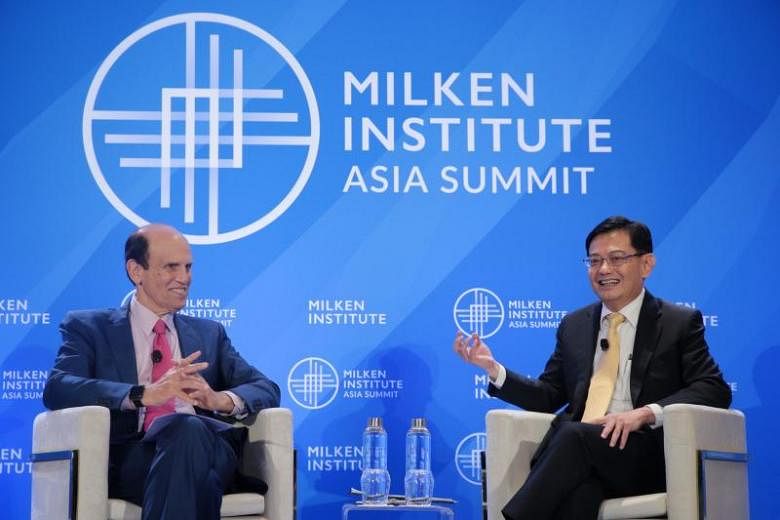SINGAPORE - Asia remains a bright spot amid global trade tensions and shifting alliances, Deputy Prime Minister Heng Swee Keat said on Thursday (Sept 19).
He is cheered that while the continent has gone through major changes, from the Vietnam War to the rise of China, it has kept faith in openness and cooperation.
"What is encouraging is that Asia continues to believe in free trade, globalisation and is working closely together," Mr Heng, who is also Finance Minister, said at a dialogue at the Milken Institute Asia Summit on Thursday.
And the region is doing more to deepen economic links and collaboration, he noted, citing ongoing talks on the Regional Comprehensive Economic Partnership (RCEP) as a major development.
The regional trade pact led by Asean is being negotiated among 16 countries - all 10 Asean members, Australia, China, India, Japan, New Zealand and South Korea - and has to be managed in a way that does not shut itself out to others, he noted.
"This is not Fortress Asia. It is a way of catalysing the multilateral system, to make sure that we continue to inject momentum into the Doha Round," he said, referring to negotiations at the World Trade Organisation that have long stalled.
At the dialogue, which was moderated by Milken Institute chairman Michael Milken, Mr Heng stressed that the global trading system is not a zero sum game. All negotiating parties must discuss the "pluses and minuses" and how they can accommodate one another in their growth.
The key, he added, was working with like-minded countries to continue to sustain the momentum for free trade and globalisation.
"Those at top of the value chain will not always stay at the top, and those at bottom, will not always stay at the bottom - this is not equitable. Those at top will need to run a little faster, and those at bottom will catch up."
Speaking on the conference theme of "Asia at a Crossroads", Mr Heng said that there had to be a new division of global labour, in a way that would maintain peace and stability and allow governments to improve the lives of their people.
The global division of labour was a major development after World War II that had allowed many countries to catch up, he said, citing former Chinese leader Deng Xiaoping's role in China's 40 years of reform and opening up, which had created enormous momentum for the country's growth.
Asked by a Reuters journalist whether he would consider more expansionary spending during the economic downturn, Mr Heng said Singapore's Government is ready to do "what needs to be done at the right time" to support the economy.
In response to a question by Mr Milken on technological disruption and what Singapore was doing to prepare its workforce for the future, Mr Heng said that the Government was expanding education at both ends - through recently announced additional subsidies for pre-school, so that children would have a better foundation; and at the other end, lifelong learning and partnering companies to train workers.
"Going to school, education, starting work and retiring - that paradigm is over. There are now multiple stages of learning, un-learning and re-learning," he said. This was supported by trade unions, which did not resort to the picket line but worked pro-actively with companies to persuade workers to undergo training.
He added that Singapore was investing heavily in research and development (R&D), in anticipation of a future that will be shaped by science, technology and innovation.
"We have R&D in our universities and institutes in the basic sciences... but that has evolved into areas we did not fully expect (such as) the growth of medtech and the food industry, including alternative ways of producing food."
The other part of the equation is translating research into enterprise, which has seen companies partner universities to set up corporate laboratories, and led to a growing start-up scene in Singapore.
An interesting development is the opening up of the digital payments space to non-banking institutions, he added, noting that the Monetary Authority of Singapore was accepting applications for new digital bank licences.
"The region can do more to promote greater inter-operability and payment," he said.
Mr Heng noted that e-commerce was dramatically changing the shape of industry and traditional definitions of national borders, adding: "I won't be surprised if someday we will have a payment system throughout Asia and the world that will make payment a lot easier."
The conference, which is into its sixth year, is attended by around 1,500 business and government leaders.


